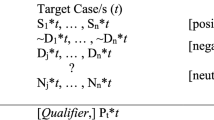Abstract
We specify a form of analogical reasoning in terms of a system of hypothetical reasoning based on mathematical logic. Our primary motivation is a deeper understanding of analogical reasoning as well as its relationship to existing logical models of nonmonotonic reasoning.
We begin with a brief description of a hypothetical reasoning system called Theorist. Theorist is a nonmonotonic clausal theorem prover that permits consistent instances of hypotheses to participate in a deductive derivation. Such sets are viewed as explanatory theories for goal observations, which are simply questions assumed true in the intended interpretation.
Our specification of analogical reasoning assumes two relatively simple and uncontroversial properties of analogical reasoning. First, analogical reasoning is non-deductive. Second, analogical reasoning is based on similarity relationships between so-called source and target objects. We use Theorist's specification of hypothetical reasoning to provide us with the required non-deductive mechanism, and interpret similarity relationships as hypotheses about various kinds of equality between source and target objects.
Preview
Unable to display preview. Download preview PDF.
Similar content being viewed by others
References
S.E. August and M.G. Dyer. Analogy recognition and comprehension in editorials. Technical report, Computer Science Department, University of California at Los Angeles, Los Angeles, California, April 1986.
M.H. Burnstein. Concept formation by incremental analogical reasoning and debugging. In R. Michalski, J.G. Carbonell, and T.M. Mitchell, editors, Machine Learning, volume II, pages 351–369. Morgan Kaufmann, Los Altos, Ca., 1986.
K.L. Clark. Negation as failure. In H. Gallaire and J. Minker, editors, Logic and Databases, pages 293–322. Plenum Press, New York, 1978.
R.P. Daley. Twards the development of an analysis of learning algorithms. In K.P. Jantke, editor, Analogical and Inductive Inference, volume 265 of Lecture Notes in Computer Science, pages 1–18. Springer-Verlag, New York, 1987.
T.R. Davies and S.J. Russell. A logical approach to reasoning by analogy. In Proceedings of IJCAI-87, pages 264–270, Milan, Italy, August 23–28 1987.
J.J. Finger. Residue: a deductive approach to synthesis. Technical Report STAN-CS-85-1035, Department of Computer Science, Stanford University, Stanford, California, 1985.
R. Goebel and S.D. Goodwin. Applying theory formation to the planning problem. In Proceedings of the AAAI Workshop on The Frame Problem in Artificial Intelligence, pages 207–232, Lawrence, Kansas, April 12–15 1987.
R. Greiner. Learning by understanding analogies. Artificial Intelligence, 35(1):81–125, 1988.
M. Haraguchi and S. Arikawa. Reasoning by Analogy as a Partial Identity between Models. In K.P. Jantke, editor, Analogical and Inductive Inference, volume 265 of Lecture Notes in Computer Science, pages 61–87. Springer-Verlag, New York, 1987.
R.P. Hall. Computational approaches to analogical reasoning: A comparative analysis. Artificial Intelligence, 39(1):39–120, 1989.
D.R. Hofstadter and M. Mitchell. Concepts, analogies, and creativity. In Proceedings of CSCSI-88, pages 94–101, Edmonton, Alberta, June 6–10 1988.
D.J. Israel. What's wrong with non-monotonic logic? In Proceedings of AAAI-80, pages 99–101, Stanford, California, August 18–21 1980. Stanford University.
D.J. Israel. The role of logic in knowledge representation. Computer, 16(10):37–41, 1983.
D.J. Israel. On cheeseman. Computational Intelligence, 4(1):85–86, 1988.
K.P. Jantke, editor. Analogical and Inductive Inference, volume 265 of Lecture Notes in Computer Science. Springer-Verlag, New York, 1987.
S.T. Kedar-Cabelli. Analogy — From a Unified Perspective. Technical report, Laboratory for Computer Science Research, Rutgers University, New Brunswick, New Jersey, December 1985.
H. Levesque (ed.). Taking issue: Mcdermott's a critique of pure reason. Computational Intelligence, 3(3), 1987.
J.W. Lloyd and M.H. van Emden. A logical reconstruction of Prolog ii. In Proceedings of the Second International Logic Programming Conference, pages 115–125, Uppsala, Sweden, July 2–6 1984. Uppsala University.
D.V. McDermott. A critique of pure reason. Computational Intelligence, 3(3):151–160, 1987.
Ch. Melis and Melis E. Some considerations about formalization of analogical reasoning. In K.P. Jantke, editor, Analogical and Inductive Inference, volume 265 of Lecture Notes in Computer Science, pages 125–134. Springer-Verlag, New York, 1987.
M. McLeish (ed.). Taking issue: Cheeseman's an inquiry into computer understanding. Computational Intelligence, 4(1):57–142, 1988.
L.T. McCarty and N.S. Sridharan. A computational theory of legal argument. Laboratory for Computer Science Technical Report LRP-TR-13, Department of Computer Science, Rutgers University, New Brunswick, New Jersey, November 1981.
D. Poole, R. Goebel, and R. Aleliunas. Theorist: A logical reasoning system for defaults and diagnosis. In N.J. Cercone and G. McCalla, editors, The Knowledge Frontier: Essays in the Representation of Knowledge, pages 331–352. Springer Verlag, New York, 1987.
G. Polya. How to Solve It: A New Aspect of Mathematical Method. Princeton University Press, Princeton, New Jersey, second, 1957 edition, 1954.
D.L. Poole. Variables in hypotheses. In Proceedings of IJCAI-87, pages 905–908, Milan, Italy, August 23–28 1987.
D. Poole. A logical framework for default reasoning. Artifical Intelligence, 36(1):27–47, 1988.
R. Reiter. A logic for default reasoning. Artificial Intelligence, 13(1&2):81–132, 1980.
R. Reiter. Nonmonotonic reasoning. In Annual Reviews of Computer Science, pages 147–186. Annual Reviews of Computer Science, New York, 1987.
R. Reiter. A theory of diagnosis from first principles. Artificial Intelligence, 32(1):57–95, 1987.
P.H. Winston. Learning and Reasoning by Analogy. ACM Communications, 23(12):689–703, 1980.
Author information
Authors and Affiliations
Editor information
Rights and permissions
Copyright information
© 1989 Springer-Verlag Berlin Heidelberg
About this paper
Cite this paper
Goebel, R. (1989). A sketch of analogy as reasoning with equality hypotheses. In: Jantke, K.P. (eds) Analogical and Inductive Inference. AII 1989. Lecture Notes in Computer Science, vol 397. Springer, Berlin, Heidelberg. https://doi.org/10.1007/3-540-51734-0_65
Download citation
DOI: https://doi.org/10.1007/3-540-51734-0_65
Published:
Publisher Name: Springer, Berlin, Heidelberg
Print ISBN: 978-3-540-51734-4
Online ISBN: 978-3-540-46798-4
eBook Packages: Springer Book Archive




